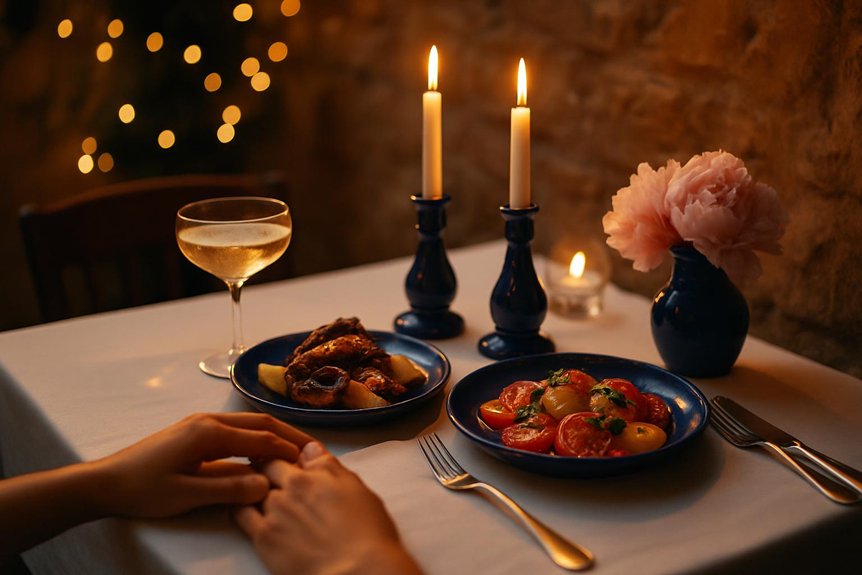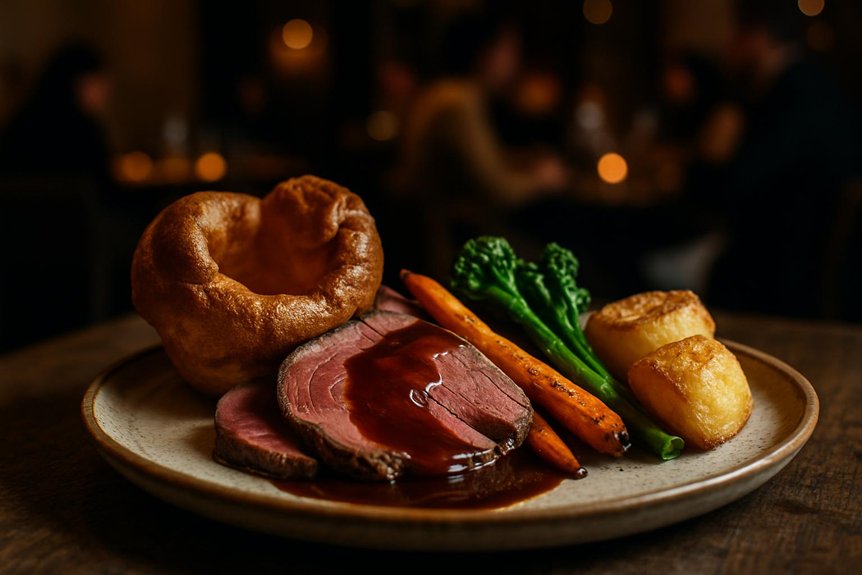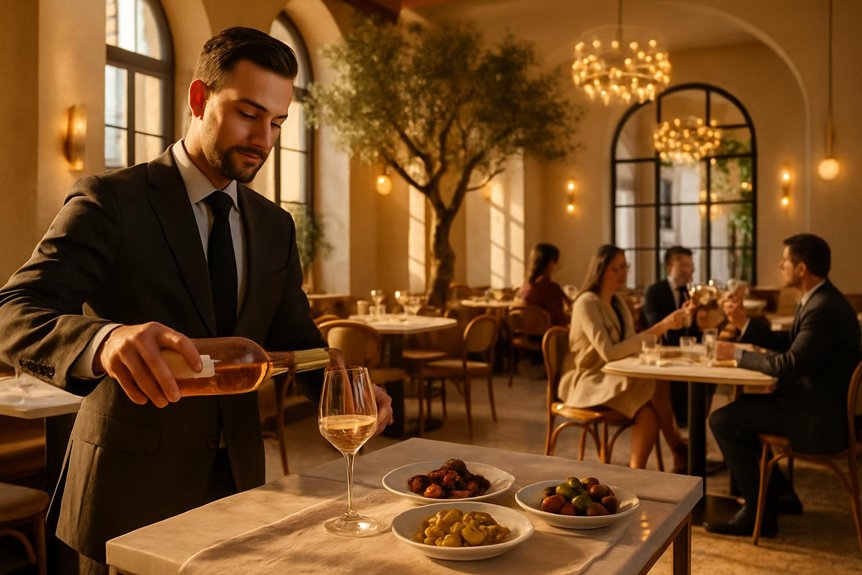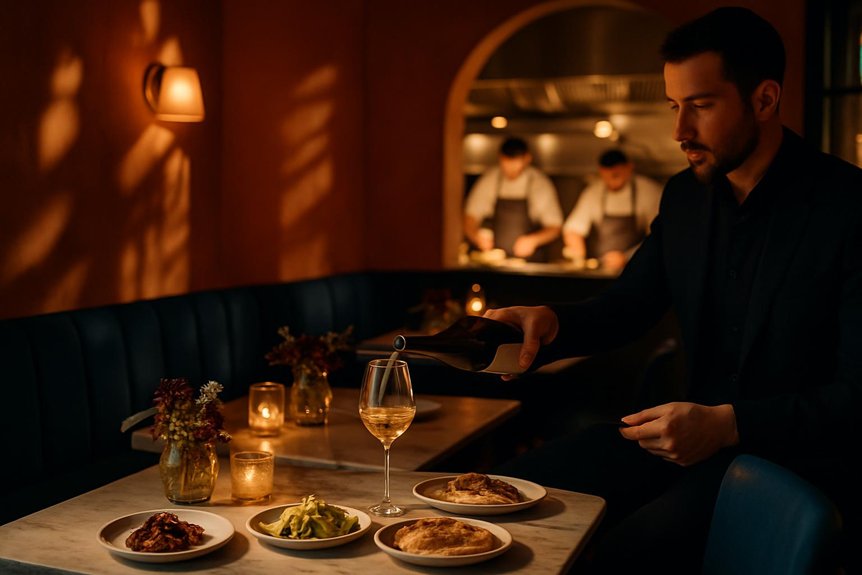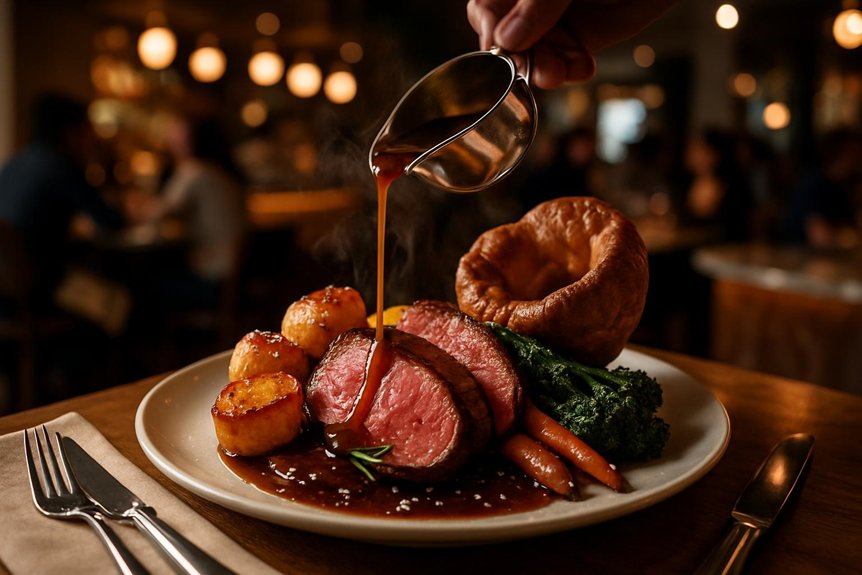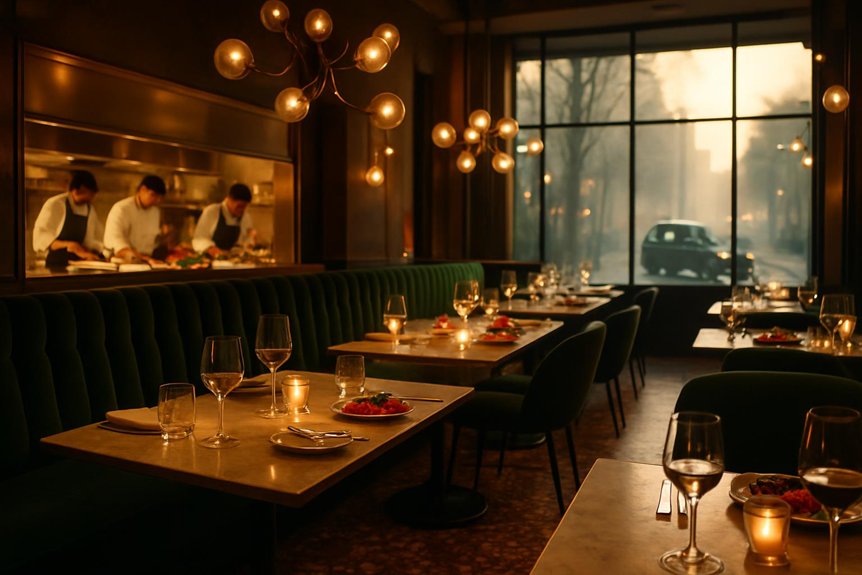In Fitzrovia, Meraki blends British roast traditions with Mediterranean finesse. Plates feature rested meats, vibrant vegetable centerpieces, and crisp Yorkshire puddings. Sauces are bright, gravies polished, and sides nod to Greece with roasted lemon potatoes and charred greens. The room is warm, the service measured, and the wine list quietly confident. Portions satisfy without bluster. It sounds simple, yet there’s a detail at the table that changes what a Sunday roast can be.
Where Mediterranean Style Meets British Tradition
Though rooted in British comfort, the roast takes on Mediterranean poise through restraint and bright flavor. At Meraki, the joint is treated with olive oil, lemon, and herbs, letting natural juices lead while crisp edges signal careful heat.
Vegetables are charred, not smothered, and grains replace heft with lift, shaping a plate that feels both familiar and agile. This cultural fusion respects Sunday ritual yet sidesteps heaviness through culinary innovation.
Sauces lean on citrus and thyme rather than cream, giving clarity to rich meats. Seasonal produce sets the rhythm: fennel, tomatoes, and greens cut through fat with clean acidity. Yorkshire elements remain, but textures are tuned—crunch against tenderness, brightness against savor—crafting a roast that honors tradition while moving it forward with quiet confidence. The exceptional service from the welcoming staff enhances the experience, making diners feel truly valued amidst the sophisticated ambiance.
The Setting: Chic Fitzrovia Warmth
If the roast rethinks tradition on the plate, the room frames it with quiet poise.
Meraki’s Fitzrovia address blends townhouse elegance with a modern Mediterranean cool, casting warm light across pale stone and soft woods. The design favors clean lines, draped banquettes, and a muted palette that lets conversation breathe without strain.
Details sharpen the impression. Table settings are crisp yet unfussy—linen that holds a crease, polished glassware catching amber glints, ceramics with tactile edges. Staff move with calm cadence, keeping the flow unruffled.
Music playlists lean toward mellow soul and sun-bleached jazz, low enough to anchor mood, never to intrude. Windows draw in neighborhood life, while fragrant herbs near the bar hint at coastal ease within a London rhythm.
Meraki Bar and Living Room Bar launched for after-work drinks create a perfect blend of relaxation and sophistication, making it an ideal spot for both dining and socializing.
Star of the Show: The Sunday Roast Lineup
Three plates define the ritual: beef, lamb, and a meat-free centerpiece, each with its own cadence.
The kitchen favors precision: beef arrives blushing and rested, lamb carved to reveal herbal depth, while the vegetarian option leans on texture and umami rather than mimicry.
Yorkshire puddings crown the meats; sauces are disciplined—horseradish bright, mint poised, gravy glossy and restrained.
Service guides tempo and dining etiquette without fuss, pacing courses so heat and juiciness hold.
Knife work matters; slices yield with minimal pressure, signaling careful roasting.
Wine pairing suggests structure over heft: a supple Pinot Noir flatters the beef, a spiced Syrah lifts the lamb, and a textured white—perhaps Assyrtiko—supports the plant-led plate.
Portions satisfy, leaving room for conversation.
For a lively night, Meraki Restaurant offers dining, dancing, and great vibes throughout the weekend.
Seasonal Sides With Sunny Greek Flair
Beyond the roasts and restrained sauces, the table widens to sunny Greek accents that cut richness and lift aroma. Seasonal produce arrives with crisp edges and bright zest: lemon-splashed potatoes roasted until crackling, charred courgettes brushed with olive oil, and tomatoes warmed just enough to sweeten.
Mediterranean herbs—oregano, dill, thyme—thread through each bite, lending savory lift without heaviness.
A bowl of horta, simply wilted greens with citrus and sea salt, balances the deeper flavors. Beetroot with yogurt and crushed pistachio offers earthy snap and cool tang.
Rustic plating underscores the unforced style: pans brought from oven to table, edges browned, colors unmasked. Everything feels generous yet measured, a counterpoint that keeps the roast center-stage while shining with Greek sun.
Sauces, Gravies, and Finishing Touches
The roast finds its allies in sauces that clarify rather than cloud. At Meraki, precision rules the plate: lemon-thyme jus for chicken, rosemary-laced lamb gravy brightened with oregano, and a peppercorn pan sauce tempered by feta whey for beef. Each is reduced to gloss, not glue, letting crisp fat and blush interiors speak.
Gravy recipes lean on proper deglazing—white wine for poultry, Xinomavro vinegar for beef drippings—then mounted with cold butter for sheen. A subtle skordalia emulsion replaces heavy mustard, offering garlic depth without weight. Herb oils—dill, mint, and wild thyme—finish with clean perfume.
Thoughtful sauce pairings extend to vegetables: charred carrot tops yield a verdant pistou; roasted garlic molasses lifts parsnips; caper-lemon relish snaps roast potatoes to attention.
The Greek Wine Pairing Cheat Sheet
He introduces a quick guide to Greek bottles that matter, from citrus‑snapped Assyrtiko and peppery Xinomavro to fragrant Moschofilero.
He maps these grapes to classic plates—grilled lamb, lemon chicken, and seafood—so pairings feel automatic.
He then frames budget-to-splurge picks, offering weekday options alongside celebratory labels.
Native Greek Grape Highlights
Curiously, a few native Greek grapes offer remarkably precise pairings for a Sunday roast. From celebrated Greek vineyards across sunlit wine regions, these varieties deliver structure, vivacity, and savory nuance that complement roasted meats and trimmings.
Xinomavro from Naoussa brings red cherry, tomato leaf, and firm tannins; its acidity cuts fat while umami tones echo pan drippings. Agiorgitiko from Nemea offers plummy fruit, gentle spice, and silky tannins for medium-bodied harmony. Limniona supplies red-fruited lift and fine-grained texture, ideal where delicacy is needed. Mavrodaphne, dry-styled, contributes dark fruit, bay, and resinous herbs for deeper gravies.
For whites, Assyrtiko from Santorini sharpens the plate with saline edge and citrus drive, while Vidiano or Moschofilero add aromatic breadth without weight, invigorating the palate between bites.
Classic Dishes and Matches
From spanakopita to lamb kleftiko, classic Greek dishes find clear partners in native varieties and a few well-chosen internationals. The guidance remains simple: match texture and intensity, respect herbs, and keep acidity lively.
At Meraki, staff nod to dining etiquette and wine etiquette without fuss, steering toward balance rather than bravado.
- Spanakopita and Assyrtiko: the zesty, saline cut refreshes pastry and spinach, lemon and dill lifted cleanly.
- Lamb kleftiko and Xinomavro: firm tannin and savory tomato-leaf notes frame slow-roasted richness; decanting helps.
- Grilled octopus and Moschofilero: floral lift and gentle grip accompany char and smoke; avoid heavy oak.
- Moussaka and Agiorgitiko: ripe red fruit, moderate tannin, and spice meet béchamel and cinnamon warmth.
Glassware, serving temperature, and pacing complete the pairing.
Budget-To-Splurge Bottle Picks
A smart list of bottles—tiered from weekday steals to celebration splurges—makes Greek pairing effortless.
For value, he notes crisp Moschofilero from Mantinia: citrus and rose lift salads and herbed starters, a clean wine pairing with Greek influences. An unoaked Roditis, saline and brisk, slips alongside roast chicken and lemon potatoes.
Moving mid-tier, Assyrtiko from Santorini brings volcanic grip for pork or crackling; a Peloponnese Agiorgitiko, soft tannins and sour cherry, steadies lamb and mint.
For richer roasts, Xinomavro from Naoussa adds autumnal spice and structure without heaviness.
Splurge-worthy picks include aged Santorini Assyrtiko or single-vineyard Xinomavro for depth, and a sweet Vinsanto to close with honeyed nuts or dessert.
Each tier keeps flavors focused, budgets intact, and pairings intuitive.
Vegetarian and Lighter Roast Alternatives
A seasonal vegetable centerpiece can anchor the table, offering roasted squash, brassicas, or mushrooms with crisp edges and tender cores.
Plant-based gravy options—such as mushroom reduction, miso-onion, or fortified vegetable jus—bring depth without heaviness.
Lighter sides and salads, from lemony grains to shaved fennel or bitter greens, keep the roast balanced and bright.
Seasonal Vegetable Centerpiece
In place of meat, a vibrant seasonal vegetable centerpiece anchors the roast with color, texture, and depth. At Meraki, the composition changes with the market: roasted squash crescents, blistered brassicas, and charred roots layered over herb-studded grains. The approach leans toward fusion cuisine, pairing Mediterranean perfume with London’s market sensibility, delivering balance and quiet Sunday relaxation without heaviness.
- Roasting method: high heat caramelizes edges while preserving bite, creating contrast against silky purées.
- Flavor architecture: citrus zest, tahini, and sumac spark brightness; toasted seeds add savor and crunch.
- Seasonal logic: spring asparagus and peas, summer courgettes, autumn pumpkins, winter beets—each treated to its peak.
- Textural harmony: crisp leaves, tender centers, and warm grains ensure completeness alongside classic sides and Yorkshire components.
Plant-Based Gravy Options
Though tradition leans on meat drippings, plant-based gravies deliver depth without heaviness by building umami from roasted vegetables, mushrooms, and fortified stocks. At Meraki, a glossy reduction draws on caramelized onions, porcini, and a splash of Madeira, thickened with a light roux to coat without cloying.
A second Vegan gravy layers miso, tamari, and dried seaweed for saline complexity, balanced with roasted garlic and a hint of black pepper.
Vegetarian alternatives include a butter-enriched mushroom jus, offering silkier texture while staying meat-free. For gluten-avoiding diners, a slurry of arrowroot or cornflour keeps the finish clear and lustrous.
Each option is seasoned to complement herbal notes from the roast, allowing plant-led centerpieces to feel complete, satisfying, and unmistakably Sunday.
Lighter Sides and Salads
Bright, herb-forward sides lighten the plate without sacrificing comfort: shaved fennel and apple dressed with lemon and olive oil cuts through richness; grilled asparagus with mint and pistachio brings crunch and perfume; and a tomato-bread panzanella swaps heavy starches for juicy acidity.
At Meraki, lighter choices echo the roast’s warmth while favoring fresh greens and Mediterranean herbs. Diners find balance without retreating from flavor, and vegetarians gain substantial options that complement, not mimic, the main event.
- Citrus-kissed bitter leaves with dill and parsley, adding snap to roasted roots.
- Charred courgettes, oregano, and lemon zest, finished with feta for salinity.
- Bulgur, cucumber, and herbs—tabbouleh reimagined with roasted cherry tomatoes.
- Warm chickpeas, smoked paprika, and spinach, a protein-forward counterpoint.
These sides reset the palate and keep the meal energetic.
Service, Hospitality, and Meraki’s Spirit
How does a dining room communicate care before a single plate lands on the table? At Meraki, attentiveness shows in unforced greetings, coats whisked away, and water poured without prompting. Staff move with steady confidence, reading the room rather than reciting scripts.
Seating balances buzz with comfort; lighting softens edges, keeping conversation at ease.
Servers know the roast’s timings and quietly pace courses so diners never wait nor rush. They guide choices with succinct, informed suggestions, including dessert pairings that complement the roast’s herbal tones.
For early arrivals, they mention brunch options with equal poise, never pushing. Managers circulate, noticing small needs—a fresh napkin, another gravy boat—before requests form. The result feels seamless: hospitality that anticipates, not interrupts, and a spirit grounded in practiced warmth.
Value, Portions, and When to Book
Even before prices are considered, the roast’s generosity signals value: slices run thick, vegetables arrive in true shareable abundance, and gravy and horseradish are replenished without fuss. Portions suit hearty appetites, yet remain polished enough for a slower sunday brunch.
Pricing feels justified by ingredient quality and consistency, with dessert pairings sensibly portioned to share after the mains.
Booking strategy matters, especially for peak hours. Early tables secure the best pacing and cut selection, while later seatings suit those prioritizing a leisurely rhythm.
For planning at a glance:
- Reserve 5–7 days ahead for prime Sunday slots.
- Aim for noon or 1 p.m. for family-sized portions.
- Choose mid‑afternoon for quieter dining.
- Add dessert pairings when booking to ensure availability.
Walk-ins succeed only between peak waves.
How to Make a Lazy Sunday Last Longer
Though the plates clear, the afternoon needn’t rush. Time stretches when diners step from Meraki’s roast into measured wanderings: a short stroll through Fitzrovia, a windowed café for an unhurried macchiato, then a gallery pause. Conversation slows, phones stay pocketed, and the day loosens its grip.
He notices how nouvelle cuisine once taught London to savor small moments, not just small portions; she studies modernist plating as a reminder that arrangement affects tempo.
Return for tea, not cocktails—lighter, longer. Share a single dessert, let spoons linger. Choose a corner banquette, where light lengthens and voices soften. Commit to one plan less than usual. When the bill arrives, walk the long way to the Tube.
The roast becomes a gentle corridor into evening.
Conclusion
As afternoon light fades, Meraki’s plates resemble compass roses—pointing north to British hearth and south to sunlit isles. Yorkshire peaks cradle tides of gravy, while lemoned potatoes glow like small suns setting on winter shores. The room hums, a ship at harbor, unhurried and sure. Glasses chime, anchors lift; the week’s weight loosens. Guests depart warmed, carrying a pocket-sized coastline of comfort—proof that a well-made roast can redraw maps and extend Sunday’s horizon.





